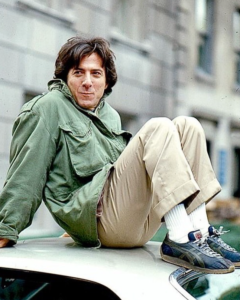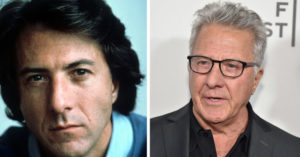In 2013, the talented actor Dustin Hoffman, who is most known for his part in the film Rain Man, fought cancer in a quiet manner and ultimately triumphed over it. Even after he had won, he made the decision to conceal his recovery and only sometimes brought it up in conversation. Following the completion of an effective course of therapy, Hoffman’s spokeswoman, Jodi Gottlieb, announced that the patient was “feeling great and in good health.” It was possible to entirely remove the cancer by performing surgery and detecting it at an early stage.

In 1967, Hoffman was nominated for his first Academy Award for his breakthrough performance in the romantic comedy “The Graduate.” This performance made him famous for the first time and earned him a nomination for the award. His rise to prominence occurred when he was thirty years old, and he left an indelible mark on the cinema business. In films such as the emotionally stirring drama “Kramer vs. Kramer” (1979) and the picture “All the President’s Men” (1976), Hoffman offered performances that were really remarkable.

In the film “Tootsie,” Hoffman played the character of a male who pretended to be a woman in order to get a position in a soap opera. This portrayal is considered to be one of Hoffman’s most famous performances. Hoffman said that the encounter had a huge impact on the way he had previously seen women. It came as a complete surprise to him when he found out that he was not thought to be conventionally beautiful as a woman. This realization led him to see how the expectations of society unnecessarily restrict the looks of women. Not just in real life but also on television, his conduct toward women was irrevocably changed as a result of this realization.

Hoffman looked beyond the humorous aspects of “Tootsie,” despite the fact that it turned out to be a big success. The film explored more relevant topics and struck a powerful chord with audiences, which contributed to its meteoric rise to the position of the second highest-grossing film of the year.
Hoffman was awarded his first Academy Award for his role in the film Kramer vs. Kramer in 1988. He then went on to win his second Academy Award for his excellent performance in the film Rain Man. In acknowledgement of his exceptional abilities, he was honored with six Golden Globe Awards and one Primetime Emmy Award. Hoffman was in high demand due to the fact that his career was flourishing.
However, in 2013, he suddenly vanished from the public eye, leaving his supporters to speculate about his whereabouts and wondering where he had gone. They were completely unaware of the fact that Hoffman was quietly battling cancer.

It wasn’t until a few months after he completed shooting Chef in 2014 and helmed the British comedy Quartet in 2012 that the cause for his isolation was made public. Chef was a film in which he co-starred alongside Jon Favreau and Sofia Vergara. The fact that Hoffman had been treated for cancer was disclosed by his agent, who said that the individual had chosen to keep the information confidential. It was announced to the general public by Hoffman’s publicist, Jodi Gottlieb, that the individual was in excellent health and had fully recovered from suffering from the sickness.
Hoffman’s career was never undone by his health problems, despite the fact that he had to deal with them. Since he was diagnosed with cancer, he has made appearances in a number of films, such as “Sam and Kate” in 2022 and the impending science fiction thriller “Metropolopolis” in 2024. Furthermore, he continued to provide the voice of the cherished Master Shifu in two further editions of the Kung Fu Panda series between the years 2008 and 2024 through the year 2024.
It was recently observed that Hoffman and his wife were seen walking around the streets of London, exuding pleasure and care for one another. Despite being 86 years old, the Hollywood great gave off the impression of being young and carefree as he interacted with photographers and shopped at shops with his wife, who was 43 years old.
The path that Dustin Hoffman has taken is illustrative of his resilient nature and unyielding dedication to his trade. His struggle against disease serves as a potent reminder that, despite the difficulties we face, it is possible to triumph over adversities and follow our objectives with persistence. His tale, which emphasizes the fortitude and determination required to prevail in the face of adversity, serves as a source of motivation for a great number of people out there.
